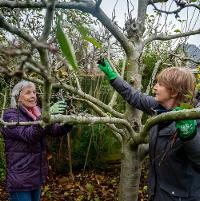As we face a prolonged pandemic, many people feel we are ageing faster than before. Apart from generic variations, behaviours and life events also influence how quickly we age. Infectious disease, stress and loneliness resulted from the COVID 19 pandemic can affect our body and accelerate the biological ageing process. Accelerated ageing leads to shorter life span or health span (how long someone remains healthy).
Infection disease has a connection with accelerated ageing. Studies shows that HIV accelerates the ageing and death of immune cells. Some researchers think COVID 19 can result in chronic inflammation and accelerated biological ageing. Luigi Ferrucci, a geriatrician and epidemiologist at the US National Institute on Aging in Baltimore, Maryland says “When inflammatory reactions to the COVID-19 virus are high, the immune system can become less resilient in the long term, potentially leaving some people less able to resist the effects of ageing. Their compensatory mechanisms have already been consumed by fighting COVID-19,”
Stress can lead to accelerated ageing. Survivors from weather disasters or time in prison can experience accelerated ageing. Even worries about ageing can likely speed up ageing!. The pandemic brought in uncertainties, fear and day to day disruptions such as taking care of family members while working (school closures for students, illness or even death of loved ones etc.). The pandemic also caused digital addiction. Many people spend a lot of time in digital devices following often scary and emotionally exhausting news stories. These stories have been curated by media companies which aim to keep the audience online as long as possible. It builds up stress, anxiety and disrupts daily routines.
During the pandemic, more than 1/3 of world population have been under lockdowns. Elder adults have experienced a higher degree of loneliness and isolation as nursing homes were closed to visitors, restrictions of movements and many social and health services shut down. Researchers have linked social isolation and loneliness with a 50% greater chance of developing dementia, a 29% higher risk of incident coronary heart disease, and a 32% greater risk of stroke12 — all ageing-related diseases and concluded a profound and on older adults’ health and well-being globally.
On the other hand, people live with circumstances differently. Some people seem to age much slower than others. The slowest ager gained only 0.4 "biological years" for each chronological year while the fastest ager gained 2.5. Therefore, policy makers are promoting activities to reduce stress, enhance nutrition and well-being and community building.
Firstly, people should try to take breaks from watching, reading or listening to news stories from phone, TV and computer screens. Meditation and mindfulness practice can support mental health during the pandemic. A strong life purpose also reduces loneliness and isolation. Learning new skills not only can slow cognitive ageing but re-skilling is already a top priority during and after the pandemic, especially when many people lose interests to their previous jobs. Establish a new daily routine can improve focus, productivity and reduce anxiety.
Furthermore, people should take care of own body through healthy eating, exercising and avoid excessive alcohol and tobacco. WHO issued suggestions for healthy diet during quarantine. Exercise has long been believed to fight ageing. The relationship with the nature has also been shifted after the pandemic restrictions. More people visit parks and green space regularly and longer and studies reported a reduction of anxiety.
Lastly, we are all “social animals” (claimed by Aristotle) and naturally we seek the companionship of others as part of our well-being. Socialising decreases stress and anxiety while supporting calm and happy feelings. The pandemic has disrupted previously established social circles and many people suffer from loneliness and isolation because of that. Digital tools have been useful to keep us connected during the social distancing time. People are also encouraged to find and keep new friends and form new social circles. Policy makers and academics rightly suggest effort to rebuild communities and facilitate the healthy recovery from the pandemic.
The experiences from the pandemic will likely have a profound and long-term impacts to us even after the end of the pandemic. If we want to prevent accelerated ageing, we can adapt positive behaviour routines, learn new skills, ensure a balanced nutrition, maintain regular exercises, go to the nature and foster new social circles. Policy makers, community members and even businesses can provide suggestions, tools, and resources to support people bouncing back and recovering from the pandemic.
About the Authors:
Luc Yao is a Visiting Fellow at the Oxford Institute of Population Ageing. Luc is based in Darmstadt, Germany and is active in the electronics industry, related start-ups, and the Open Innovation networks. His research at the Institute focuses on the adjacent domains of population ageing, innovations and strategic investments.
Opinions of the blogger is their own and not endorsed by the Institute
Comments Welcome: We welcome your comments on this or any of the Institute's blog posts. Please feel free to email comments to be posted on your behalf to administrator@ageing.ox.ac.uk or use the Disqus facility linked below.













